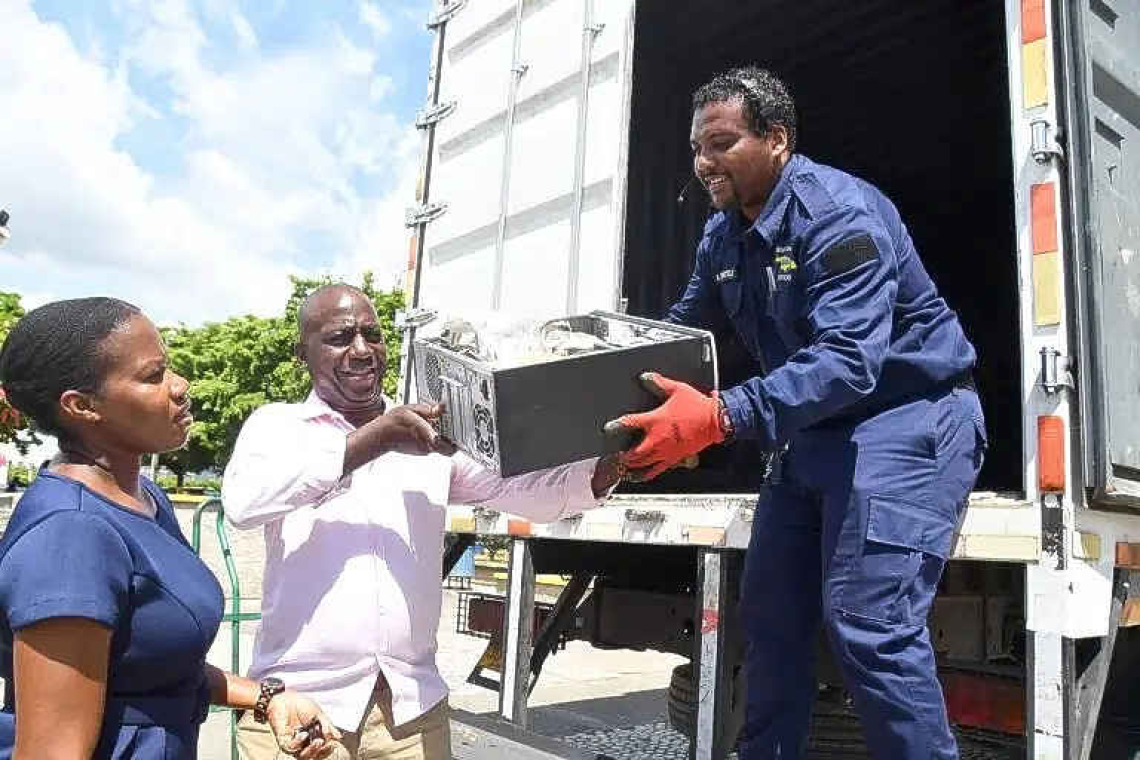Executive director of National Solid Waste Management Authority (NSWMA) Audley Gordon (centre) hands over an item of electronic waste (e-waste) to enforcement officer at NSWMA Andre Whitely while business support officer, JN Bank, Shellina Ivy, who brought in the waste for proper disposal, looks on. NSWMA on Monday was accepting e-waste from the public during its staging of a public education event in observance of International E-Waste Day at Mandela Park in Half-Way-Tree, St. Andrew. Photos credit: Garfield Robinson.
KINGSTON, Jamaica--Individuals and businesses are being encouraged to dispose of their electronic waste (e-waste) responsibly by taking them in to the National Solid Waste Management Authority’s (NSWMA’s) headquarters or its regional offices across the island.
The NSWMA is also requesting that Jamaicans separate this hazardous e-waste from regular household/commercial rubbish so it does not end up at landfills and thereby increase the danger of deadly substances being released from these discarded items.
This renewed call comes as the country joined in observing International E-Waste Day on Monday by way of a public education event hosted by NSWMA at Mandela Park in Half-Way-Tree, St. Andrew.
NSWMA executive director Audley Gordon told the “Jamaica Observer” that International E-Waste Day is celebrated worldwide, primarily because of the clear and present danger that e-waste poses to the health of people.
“Those nice phones and those nice laptops and all the lovely things [that – Ed.] make our life so easy also have chemicals in them that are really dangerous to the health of humans. They can kill, and so we wouldn’t want them to be thrown around the place and become part of the regular waste stream. We want them to be separated and isolated so that we don’t have children playing with them and getting contaminated by poisonous chemicals that are in them,” he said.
According to information provided by NSWMA’s citizen’s guide on waste management, e-waste – which refers to any equipment with plugs, cords and electronic components at the end of their useful life – has the potential to cause harm to the environment if not disposed of responsibly. These items contain several hazardous substances such as arsenic, mercury, lead, cadmium and chromium.
These substances are very harmful to the environment and human health and can cause changes in lung function, especially in children. In addition, the substances can cause DNA damage, impair thyroid function and increase the risk of some chronic diseases later in life, such as cancer and cardiovascular disease.
NSWMA said about 75% cent of toxic chemicals found at disposal facilities can be attributed to electronic waste.
“When e-waste is exposed to the heat, toxic chemicals are released into the air, damaging the atmosphere – this is one of the biggest environmental impacts of e-waste. Those toxic materials can then seep into the groundwater, affecting both land and sea animals. Electronic waste can also contribute to air pollution,” NSWMA said.
Gordon said that many people operate in ignorance regarding e-waste, and events such as International E-Waste Day serve as part of an educational thrust aimed at building the awareness of people about the dangers of e-waste and properly disposing of it.
“We have to find a way to say to [people]: ‘You have to handle this thing responsibly.’ We have to find a way to get them to behave differently, especially when the useful life of their particular item is gone. And so, to the extent that we have these days when we pause as a nation and put some focus on it, the hope is that more people will listen, more people will change their behaviour,” he said.
And for people who believe it is too much to not only be asked to separate plastic waste, but to do the same with e-waste, Gordon said people should put this in the context of their own health “and the destruction that could come to your families if you don’t do it”.
“With all the good that electronics do for humans, they pose some challenges [when they get to the end of their life] and we have to just find the will to manage it. And it’s being done on our behalf – we’re not doing it on behalf of the NSWMA, we’re not doing it on behalf of the government of Jamaica, we are doing it on our own behalf to preserve our own health and wellness,” he reasoned.
Gordon said that while NSWMA works to partner with other entities like the municipal corporations and more e-waste disposal providers to increase the number of drop-off points so as to make it easier for people to dispose of their e-waste, he is encouraging citizens to let the NSWMA handle these items until a more formal arrangement is in place.
Items considered to be e-waste are TVs, computer monitors, printers, scanners, keyboards, mice, cables, circuit boards, lamps, clocks, flashlights, calculators, phones, answering machines, digital/video cameras, radios, VCRs, DVD players and MP3 and CD players.
Items may be taken to NSWMA and MPM Waste Management Limited in Kingston; WPM Waste Management Limited in Montego Bay; NEPM Waste Management Limited in Ocho Rios; and SPM Waste Management Limited in Mandeville.
Types of e-waste the NSWMA collects are: computer monitors, personal computer units, laptops and keyboards; televisions, VCRs, DVDs and Blu-ray players; video game consoles; microwaves, toasters, coffee makers and other small household appliances; refrigerators, freezers, washers and dryers, dishwashers and other large household appliances; copiers, scanners and fax machines; stereos and radios; clothing irons, hair dryers and straighteners; lighting equipment; electronic tools; mobile phones and routers.
The NSWMA noted, however, that it is unable to collect compact fluorescent light bulbs (CFLs); items that are not structurally intact, such as TVs with broken screens; and automotive and other lead acid batteries. ~ Jamaica Observer ~







